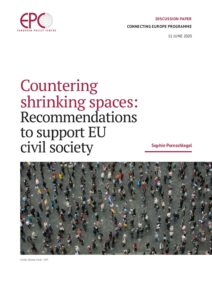Civil society is a crucial ally in safeguarding and upholding the European Union’s (EU) values. And although the EU, and in particular the European Commission, has made a conscious effort to support civil society organisations (CSOs) across Europe, it has not been enough to counter the phenomenon of ’shrinking spaces‘ effectively.
As the COVID-19 crisis is likely to harm civil society across Europe, through the growing restrictions on civil liberties and the subsequent economic recession, the need for better and more comprehensive support has never been more urgent.
Within the realm of the Treaties, the EU institutions could take a range of measures to improve its civil society support. It could come up with a more comprehensive strategy outlining its approach towards civil society; provide adequate and flexible financial resources to respond to the needs of CSOs; and improve its dialogue processes, to ‚CSO-proof‘ its legislation but also to benefit from the bridge-building function of civil society, thereby linking the EU’s support for civil society to its attempts to improve democratic participation.
While the newly presented recovery instrument and the revised proposal for the next Multiannual Financial Framework (MFF) are important steps to provide the necessary help for European societies and economies to recover, civil society support does not seem to be a priority. This is a dangerous omission. The EU must recognise the value of civil society in safeguarding democratic principles and upholding the Union’s core principles. If it fails to better support CSOs through this challenging time, the EU will be able to do little else but stand and watch as democratic backsliding intensifies across member states and, in some cases, will eventually tip over into a downward spiral towards authoritarianism.


